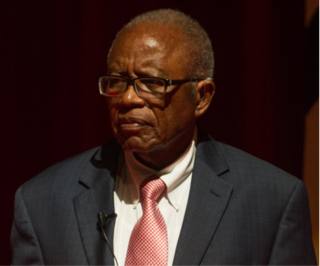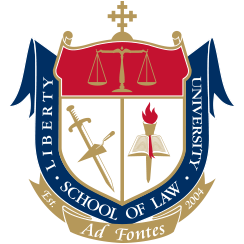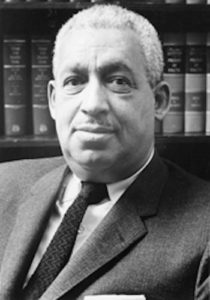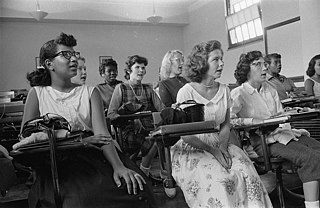Related Research Articles

The University of Houston Law Center is the law school of the University of Houston in Houston, Texas. Founded in 1947, the Law Center is one of 12 colleges of the University of Houston, a state university. It is accredited by the American Bar Association and is a member of the Association of American Law Schools. The law school's facilities are located on the university's 667-acre campus in southeast Houston.
Massive resistance was a strategy declared by U.S. senator Harry F. Byrd Sr. of Virginia and his son Harry Jr.'s brother-in-law, James M. Thomson, who represented Alexandria in the Virginia General Assembly, to get the state's white politicians to pass laws and policies to prevent public school desegregation, particularly after Brown v. Board of Education.

Fred David Gray is an American civil rights attorney, preacher, activist, and state legislator from Alabama. He handled many prominent civil rights cases, such as Browder v. Gayle, and was elected to the Alabama House of Representatives in 1970, along with Thomas Reed, both from Tuskegee. They were the first black state legislators in Alabama in the 20th century. He served as the president of the National Bar Association in 1985, and in 2001 was elected as the first African-American President of the Alabama State Bar.
The University of Texas School of Law is the law school of the University of Texas at Austin, a public research university in Austin, Texas. According to Texas Law’s 2019 disclosures, 90 percent of the Class of 2019 obtained full-time, long-term bar passage required/JD advantage employment nine months after graduation.

The UA Little Rock William H. Bowen School of Law is a public law school, part of the University of Arkansas at Little Rock. The school is both American Bar Association (ABA) accredited and a member of the Association of American Law Schools (AALS).

Marquette University Law School is the law school of Marquette University in Milwaukee, Wisconsin. It is one of two law schools in Wisconsin and the only private law school in the state. Founded in 1892 as the Milwaukee Law Class, MULS is housed in Eckstein Hall on Marquette University's campus in downtown Milwaukee.
The Thurgood Marshall School of Law (TMSL) is an ABA-accredited law school at Texas Southern University in Houston, Texas. It awards Juris Doctor and Master of Law degrees. Thurgood Marshall School of Law is a member-school of the Thurgood Marshall College Fund and Association of American Law Schools.

Arlington Heights High School is a secondary school located in Fort Worth, Texas, United States. The school serves grades 9 through 12, and is a part of the Fort Worth Independent School District. Its mascot is the Yellow Jacket and its colors are blue and gold.

The Liberty University School of Law is the law school of Liberty University, a private evangelical Christian university in Lynchburg, Virginia. The school offers the J.D., L.L.M., and J.M. degrees.

The University of Arkansas School of Law is the law school of the University of Arkansas in Fayetteville, Arkansas, a state university. It has around 445 students enrolled in its Juris Doctor (J.D.) and Master of Law (LL.M) programs and is home to the nation's first LL.M in agricultural and food law program. The School of Law is one of two law schools in the state of Arkansas; the other is the William H. Bowen School of Law.

Texas A&M University School of Law is the law school of Texas A&M University located in downtown Fort Worth, Texas. Established in 1989 as the Texas Wesleyan University School of Law, it was formerly the law school of Texas Wesleyan University until it was acquired by Texas A&M University on August 12, 2013. On August 13, 2013, fully accredited by the American Bar Association, it began operations at the same location. The law school is a member of the Association of American Law Schools (AALS) and offers the Juris Doctor (J.D.) degree through its full-time and part-time programs. Students may also pursue a Master of Laws (LL.M.) or Master of Legal Studies (M.L.S.) degree either online or in-residence.

Howard University School of Law is the law school of Howard University, a private, federally chartered historically black research university in Washington, D.C. It is one of the oldest law schools in the country and the oldest historically black law school in the United States.
The Mansfield school desegregation incident is a 1956 event in the Civil Rights Movement in Mansfield, Texas, a suburb of the Dallas–Fort Worth metroplex.

William Robert Ming Jr. was an American lawyer, attorney with the National Association for the Advancement of Colored People (NAACP) and law professor at University of Chicago Law School and Howard University School of Law. He presided over the Freeman Field mutiny court-martials involving the Tuskegee Airmen. He is best remembered for being a member of the Brown v. Board of Education litigation team and for working on a number of the important cases leading to Brown, the decision in which the United States Supreme Court ruled de jure racial segregation a violation of the Equal Protection Clause of the Fourteenth Amendment of the United States Constitution.
The North Carolina Central University School of Law is the law school associated with North Carolina Central University. The school is fully accredited by the American Bar Association (ABA) and the North Carolina State Bar Council, and is a member of the Association of American Law Schools (AALS). According to NC Central's official 2018 ABA-required disclosures, 37.9% of the Class of 2018 obtained full-time, long-term, JD-required employment nine months after graduation.

In the United States, school integration is the process of ending race-based segregation within American public and private schools. Racial segregation in schools existed throughout most of American history and remains an issue in contemporary education. During the Civil Rights Movement school integration became a priority, but since then de facto segregation has again become prevalent.
Zuberi Bakari Williams is an American attorney and jurist serving as an associate judge of the District Court of Maryland, for Montgomery County. He was appointed by former Governor Martin O'Malley in December 2014. He was later confirmed by the Maryland Senate and sworn in on January 6, 2015. At the age of 36, Williams became one of the youngest judges to be appointed in Maryland history.
Silas Herbert Hunt was a U.S. veteran of World War II who became the first African American student to enroll in a white Southern university since the Reconstruction era. He enrolled in the University of Arkansas School of Law on Feb. 2, 1948, breaking the color barrier in higher education and starting integration of colleges and universities in the South.
Christopher Columbus "C.C." Mercer was an African-American attorney from Arkansas. He was one of the "six pioneers" who integrated the University of Arkansas Law School. As an attorney, he served as an NAACP field representative to advise Daisy Bates, who spearheaded the efforts of the Little Rock Nine who integrated Little Rock Central High School.
Paul Laurence Dunbar High School and Junior College was a school for black students in Little Rock, Arkansas before integration.
References
- 1 2 "L. Clifford Davis, civil rights lawyer and judge". 13 June 2017. Retrieved 17 December 2018.
- 1 2 "Special Recognition L. Clifford Davis Johnson, Vaughn & Heiskell". Fort Worth Business Press. 25 September 2015. Retrieved 17 December 2018.
- ↑ "L. Clifford Davis" . Retrieved 17 December 2018.
- ↑ Kilpatrick, Judith. "Desegregating the University of Arkansas School of Law: L. Clifford Davis and the Six Pioneers" (PDF). Arkansas Black Lawyers. Retrieved 17 December 2018.
- ↑ Bridges, Ken (29 June 2017). "TEXAS HISTORY MINUTE: Former judge L. Clifford Davis fought for civil rights" . Retrieved 17 December 2018.